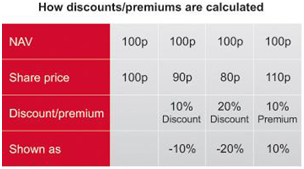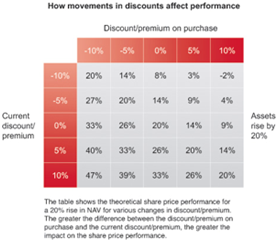Jun
2023
Investment Companies: Understanding discounts and premiums
DIY Investor
28 June 2023
Discounts and premiums are a central feature of investment trusts – this is how they work…
There are two ways that the value of a share in an investment company is often expressed:
- The share price– the price you actually buy and sell at
- The net asset value per share (NAV)
The NAV of a share is the value of all the investment company’s assets, less any liabilities it has, divided by the number of shares. However, because investment company shares are traded on a stock market, the share price that you get may be higher or lower than the NAV. The difference is known as a discount or premium.
Buying shares at a discount means you pay less than the NAV
Buying at a premium means you pay more than the NAV
Calculating Discounts and Premiums

More often than not, investment company shares tend to trade at a discount.
An investment company trading at a discount can be a buying opportunity. However, you shouldn’t assume that buying at a discount is automatically a good thing.
The price of investment company shares depends on a whole range of things, including the sentiment towards the investment company, its investment strategy and the type of investments it holds. There may be a good reason why it is trading at a discount.
When the discount changes
If you invest in investment company shares it should be for the long term so changes in the discount shouldn’t make too much difference to the end result – but it’s worth understanding nevertheless.
If you buy at a discount, and the discount narrows (the shares start trading at a price closer to the NAV) you’ll get a better return than the performance of the underlying assets
If the discount widens, you won’t necessarily make a loss so long as the NAV increases – but you won’t make as much of a gain as you otherwise would have.
Buying at a premium
When you buy shares trading at a premium, you need to have a good reason for paying more than the NAV, for example because you think the company will perform well in the future due to the type of investments it makes. However, if things don’t go well, the shares could move to a discount, increasing your losses.
The Impact of the Discount or Premium

If you’re not sure whether to buy, you should take advice from an independent financial adviser familiar with investment companies.
Understand share prices
When deciding whether to buy, remember that published share prices can be either the official last close price, the selling price (bid) or the buy price (offer).
Make sure you know which you’re looking at. You might have to buy or sell at something very different to the official last close price.
Discounts and premiums are usually calculated using the official last close price.
Click to visit:

Leave a Reply
You must be logged in to post a comment.